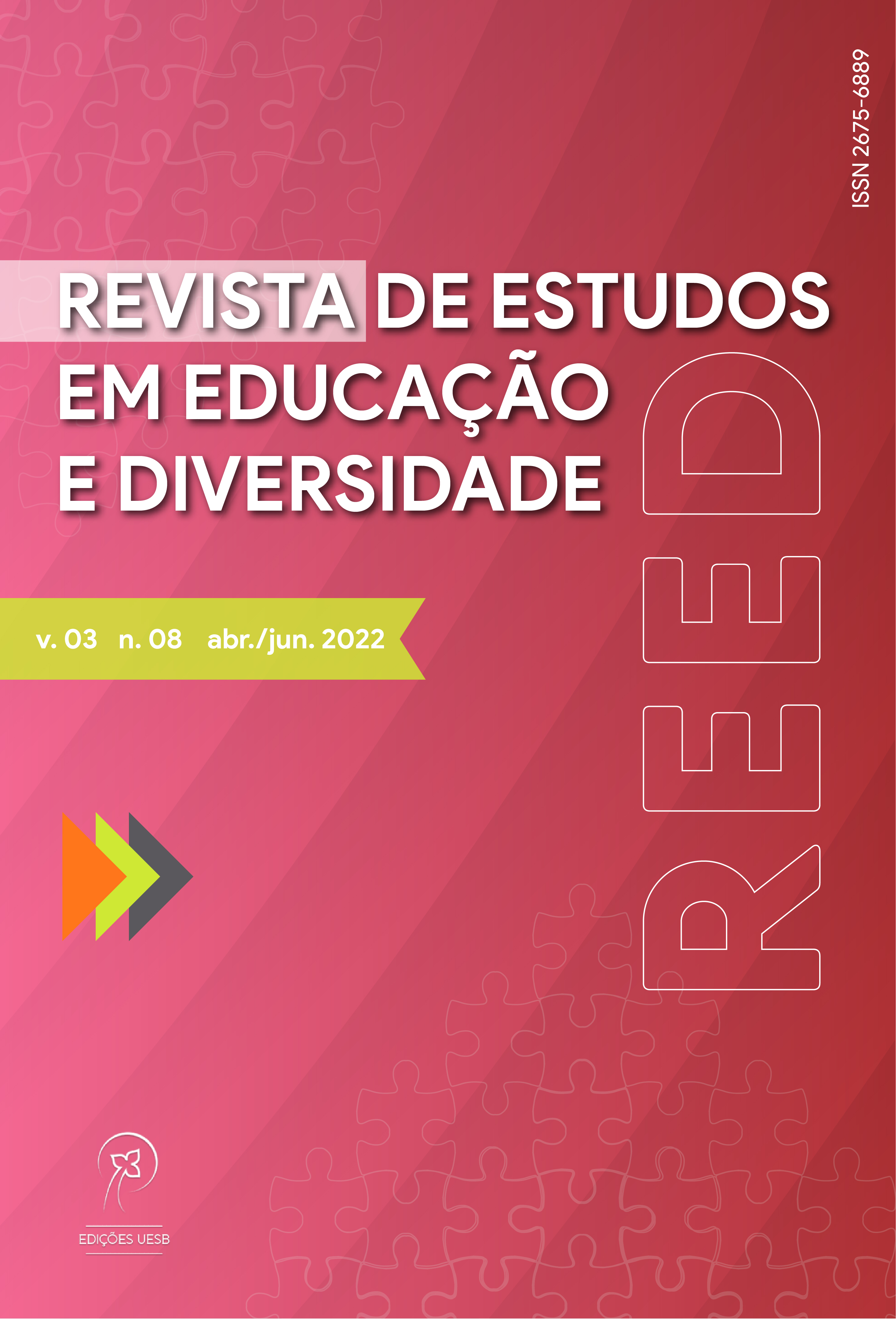ENVIRONMENTAL EDUCATION DURING THE PANDEMIC: REFLECTING FROM TEACHING PRACTICE IN ELEMENTARY SCHOOL
DOI:
https://doi.org/10.22481/reed.v3i8.11029Keywords:
Environmental Education, Pandemic, Teaching practicesAbstract
Environmental Education is part of the school as a teaching possibility whose main function is to make people aware of the impacts of human actions on nature, in addition to encouraging the fight against environmental degradation. It also encourages the individual to understand the environment in its various political, social, cultural and economic dimensions. Thinking about teaching the basic principles of Environmental Education, the present study was willing to present, briefly, its historical contextualization in basic education, as well as an analysis of reports of teachers' practice during the pandemic scenario. To achieve the proposed objectives, a qualitative research approach was used. Through a bibliographic survey and also a questionnaire, it was possible to obtain the data for the elaboration of this study. The research made it possible to verify that, regardless of the context that is installed in the world, whether adverse or favorable, Education must always fulfill the role of providing access to knowledge, enabling subjects to plan actions for the sustainable transformation of society.
Downloads
References
AMARAL, A. P. do; SANTOS, F. R.; SANTOS, M. C. dos. Contribuições da pedagogia histórico-crítica para a educação do campo e a educação ambiental emancipatória. Revista de Estudos em Educação e Diversidade, v. 2, n. 3, p. 298-317, 2021. Disponível em: https://periodicos2.uesb.br/index.php/reed/article/view/8168. Acesso em: 29 mar. 2022.
ALMEIDA, R. O.; ANDRADE, M. A. S. Convergência entre perspectivas críticas da Educação Científica, da Educação Ambiental e da Educação Intercultural na promoção do engajamento estudantil. Revista de Estudos em Educação e Diversidade - REED, v. 3, n. 7, p. 1-26, 2022.
BARDIN, L. Análise de Conteúdo. Lisboa: Edições 70, 2009.
BRASIL. Constituição (1988). Constituição da República Federativa do Brasil. Brasília, DF: Senado Federal: Centro Gráfico, 1988.
BRASIL. Atos do Poder Legislativo. Lei n° 9.795, de 27 de abril de 1999. Dispõe sobre a Educação Ambiental, institui a Política Nacional de Educação Ambiental e dá outras providências. Diário Oficial da União: Seção 1, Brasília, DF, ano 137, n. 79, p. 1-3, 28 abr. 1999.
BRASIL, Ministério da Educação. Um pouco da História da Educação Ambiental. Disponível em: http://portal.mec.gov.br/secad/arquivos/pdf/educacaoambiental/historia.pdf. Acesso em: 13 nov. 2021.
COSTA, V. M. F.; et al. Educação a Distância X Educação Presencial: como os alunos percebem as diferentes características. In: CONGRESSO BRASILEIRO DE ENSINO SUPERIOR A DISTÂNCIA, 11., 2014, Florianópolis, SC. Anais [...].v. 1, n. 1. Florianópolis, SC: UNIREDE, 2014. p. 2088-2102.
CHIZZOTTI, A. A pesquisa qualitativa em ciências humanas e sociais: evolução e desafios. Revista Portuguesa de Educação, Braga, Portugal, v. 16, n. 2, p. 221-236, 2003.
CUNHA, L. F. F.; SILVA, A. S.; SILVA, A. P. O ensino remoto no Brasil em tempos de pandemia: diálogos acerca da qualidade e do direito e acesso à educação. Revista Com Censo, Distrito Federal, v. 7, n. 3, p. 27-37, ago. 2020.
DUARTE, N. Os conteúdos escolares e a ressureição dos mortos: contribuições à teoria histórico-crítica do currículo. Campinas, SP: Autores Associados, 2016.
FERRACIOLLI, G.; RUAS, C. M. S.; SANTOS, C. A. F. O uso das tecnologias digitais para Educação Ambiental no formato remoto. Integra Ead, Campo Grande, v. 1, n. 1, p. 1-9, out. 2020.
FERRAZ, R. C. S. N.; FERREIRA, L. G.; FERRAZ, R. D. Educação em tempos de pandemia: consequências do enfrentamento e (re) aprendizagem do ato de ensinar. Revista Cocar, Edição Especial, n. 09, p. 1-19, 2021.
MARCONI, M. A.; LAKATOS, E. M. Fundamentos de metodologia cientifica. 5. ed. São Paulo: Atlas, 2003.
MOREIRA, J. V. Resenha do livro: Primavera silenciosa. Disponível em: https://petagronomia.ufc.br/pt/resenha-pet/resenha-do-livro-primavera-silenciosa/ Acesso em: 19 out. 2021.
SOARES, M. J. N. et al. (Org.). Educação Ambiental e a Pandemia do Novo Coronavírus: abordagens interdisciplinares. Aracaju: Criação, 2020.
PELICIONI, M. C. F. Educação Ambiental, qualidade de vida e sustentabilidade. Saúde e Sociedade, São Paulo, v. 2, n. 7, p. 19-31, jan. 1998.
SILVA, M. A. A. Ciência, tecnologia e sociedade, experimentação e formação inicial de professores de química: explorando possibilidades. 2016. Dissertação (Mestrado em Educação Científica e Formação de Professores) – Universidade Estadual do Sudoeste da Bahia, Jequié, 2016.
SILVA, R. S.; SILVA, M. A. A.; SILVA, J. G. Os limites e potencialidades de uma oficina temática como estratégia para o Ensino de Química. Revista de Estudos em Educação e Diversidade - REED, v. 1, p. 207-230, 2020.
TOMITA, L. M. S. Trabalho de campo como instrumento de ensino em geografia. Geografia, Londrina, v. 8, n. 1, p. 13-15, jan./ jun. 1999.
RUFINO, B.; CRISPIM, C. Breve Resgate Histórico da Educação Ambiental No Brasil e no Mundo. In: CONGRESSO BRASILEIRO DE GESTÃO AMBIENTAL, 6., 2015, Porto Alegre/RS. Anais [...].Porto Alegre/RS: IBEAS, 2015. p. 1-6.
ZANARDI, Belisa Neves. Concepção de Educação ambiental de graduandas em Pedagogia. 2010. 127 f. TCC (Graduação em Ciências Biológicas) - Universidade Presbiteriana Mackenzie, São Paulo, 2010.
Downloads
Published
How to Cite
Issue
Section
License
Copyright (c) 2022 Revista de Estudos em Educação e Diversidade - REED

This work is licensed under a Creative Commons Attribution 4.0 International License.
You are free to:
Share - copy and redistribute the material in any medium or format; Adapt - remix, transform, and build from the material for any purpose, even commercially. This license is acceptable for Free Cultural Works. The licensor cannot revoke these freedoms as long as you follow the terms of the license.
Under the following terms:
Attribution - You must appropriately give credit, provide a link to the license, and indicate if any changes have been made. You may do so in any reasonable way, but not in a way that suggests that you or your use is endorsed by the licensor.
There are no additional restrictions - You cannot apply legal terms or technological measures that legally restrict others to make any use permitted by the license.






